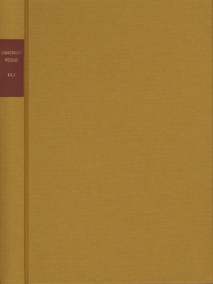Nicodemus Frischlin: Band III,3: Kommentar zu ›Priscianus vapulans‹ (Der geschlagene Priscian) und ›Iulius redivivus‹ (Julius Caesars Rückkehr ins Erdenleben)
The introductory parts of this commentary contain information on the history of the origins and the performances, on questions of metrics and on history of the material and the subjects which were the sources for the works. This is followed by line by line commentaries with explanations pertaining to the language, subject matter and persons and with verification of the other texts which Frischlin adapted in both comedies. This last point refers to the quotes taken from academic texts from all the faculties which were incorporated into the dialogues in the satire ›Priscianus vapulans‹, which from the viewpoint of late humanism were exposed to ridicule due to their barbaric linguistic form. In ›Iulius redivivus‹, Frischlin puts mainly quotes from their own works in the mouths of Caesar as well as Cicero, both of whom had come from the underworld to visit the Germania of the 16th century. These are accounted for individually with reference to the specifical historical contexts from which they originated.
Reviews
»[...] through the lens of the commentary, Frischlin’s satire is significantly clarified. Absolutely indispensable for future studies on Frischlin’s dramatic oeuvre is Jungck’s commentary on Priscianus vapulans. [...] Scholarly focus on Frischlin’s comic plays will for a long time be based on Jungck and Mundt’s well-researched volume.«
»Damit erfährt die vielseitige und bisweilen tiefgründige Dramenkunst des Philologen, Panegyrikers und Satirikers nun endlich ihre adäquate Würdigung, vor allem aber öffnet sich jetzt derenbislang für den modernen Leser noch weitgehend unzugängliche, für das Verständnis des scharfsinnigen Autors aber unverzichtbare Tiefensemantik. Die Renaissanceforschung, insbesondere die im Einzelnen noch längst nicht erschöpfend beantwortete Frage einer vielschichtigen Antikenrezeption in Deutschland um 1600 erhält somit eine wichtige zusätzliche Basis.«
»This commentary is a new jewel on the crown of the Firschlin opera omnia edition and mandatory reading for anyone who will work on ›Priscianus vapulans‹ and ›Iulius revidus‹ in the future.«
»Jungck and Mundt have provided a superb example of how close philological criticism can make unjustly neglected Latin texts accessible to a new generation of scholars. These commentaries are invaluable tools for anyone who wishes to study Frischlin’s dramas, and they set a high bar for the future work to be done in Neo-Latin philology.«
All volumes
- Band III,1: Priscianus vapulans (Der geschlagene Priscian); Iulius redivivus (Julius Caesars Rückkehr ins Erdenleben) – available
- Band III,2: Phasma – available
- Band III,3: Kommentar zu ›Priscianus vapulans‹ (Der geschlagene Priscian) und ›Iulius redivivus‹ (Julius Caesars Rückkehr ins Erdenleben) – available
- Band IV,1: Deutsche Dichtungen und Entwürfe – December 2025
- Band V,1: Lyrik I (1562-1572) – available
- Band IV,2: Deutsche Dichtungen Kommentar – in preparation
- Band V,2: Lyrik II (1573–1577) – March 2026
- Band V,3: Lyrik III (1578–1586) – in preparation
- Band V,4: Lyrik IV (1587–1590, Undatierbares) – in preparation
- Band V,5: Lyrik Kommentar – in preparation
- Band VI,1: Epische Dichtungen I – in preparation
- Band VI,2: Epische Dichtungen II – in preparation
- Band VI,3: Epische Dichtungen Kommentar – in preparation
- Band VII,1: Reden I – in preparation
- Band VII,2: Reden II – in preparation
- Band VII,3: Reden III – in preparation
- Band VII,4: Reden IV – in preparation
- Band VII,5: Reden V – in preparation
- Band VII,6: Reden Kommentar – in preparation
- Band VIII,1: Abhandlungen I – in preparation
- Subject Areas
- New Publications
- ---
- Critical Editions
- Abaelardus: Dialogus
- Andreae: Gesammelte Schriften
- Arnauld / Nicole: L'Art de Penser
- Böhme: Die Urschriften
- Böhme: Gesamtausgabe
- Bolzano: Gesamtausgabe
- Droysen: Historik
- Fichte: Gesamtausgabe
- Fischart: Sämtliche Werke
- Franck: Sämtliche Werke
- Frischlin: Sämtliche Werke
- Hülser: Die Fragmente zur Dialektik der Stoiker
- Harnack: Einleitung in das neue Testament
- Hauptmann: Sämtliche Werke
- Hegel: Vorlesungen über Rechtsphilosophie 1818-1831
- Herder: Studien und Entwürfe
- Jacobi: Briefwechsel - Nachlaß - Dokumente
- Locke: Anleitung des menschlichen Verstandes
- Maimon: Gesamtausgabe
- Meier: Beyträge
- Melanchthon: Briefwechsel
- Mendelssohn: Gesammelte Schriften
- Nicolai: Sämtliche Werke – Briefe – Dokumente
- Reinhold: Korrespondenzausgabe
- Reuchlin: Briefwechsel
- Reuchlin: Sämtliche Werke
- Scaliger: Poetices libri septem
- Schelling: Historisch-kritische Ausgabe
- Schelling: Münchener und Berliner Nachlass
- Schickard: Briefwechsel
- Shaftesbury (Anthony Ashley Cooper): Standard Edition
- Steiner: Schriften
- Svarez: Gesammelte Schriften
- Thomas von Aquin: De Unione
- Weigel: Sämtliche Schriften. Neue Edition
- Collected Works
- Series
- Bibliographies and Reference Books
- Allgemeine Zeitschrift für Philosophie
- AZP Beihefte
- Jahrbuch der Psychoanalyse
- JP Beihefte
- Steiner Studies
- Open-Access
- Single volumes
- eBooks
- Special Offers
- ---
- Authors
- Publishing house
- Links / Partner
- Paths to Philosophy
